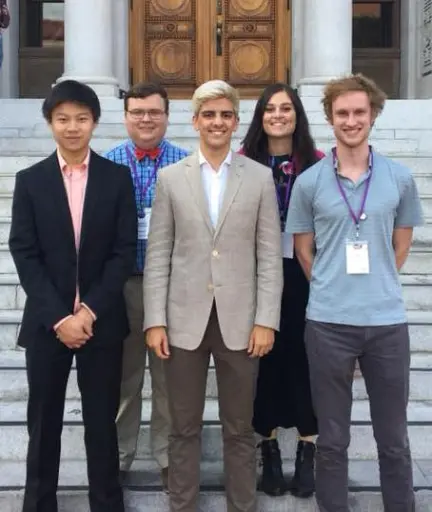Fast-moving startups are shaking up the nuclear industry with new energy and ideas, and their innovations are inspiring the next generation of nuclear leaders to embrace an entrepreneurial mindset.
“Startups are a very new development in the nuclear industry,” says Jake Quincey, a senior in nuclear engineering and engineering physics at the University of Wisconsin-Madison. “It’s only within the past decade that these startups have really popped up, and some are now getting to the point where they’re actually implementing their technology.”
Excited by the bold ideas these startups are developing, Quincey was motivated to gain entrepreneurial and business skills that will give him an edge in the evolving nuclear industry. That led him to participate in the Nuclear Innovation Bootcamp at the University of California, Berkeley, in summer 2018. The two-week event, which was co-organized by UW-Madison Engineering Physics Assistant Professor Adrien Couet, trained students and professionals in skills essential to innovation in nuclear energy.
 2018 Nuclear Innovation Bootcamp team members, from left to right: Brian Shen, University of Michigan; Charley Goodman, North Carolina State University; Francisco Fidalgo, Lancaster University; Nicole Virgili, Sapienza University of Rome; Jake Quincey, UW-Madison. Submitted photo.
2018 Nuclear Innovation Bootcamp team members, from left to right: Brian Shen, University of Michigan; Charley Goodman, North Carolina State University; Francisco Fidalgo, Lancaster University; Nicole Virgili, Sapienza University of Rome; Jake Quincey, UW-Madison. Submitted photo.
During the bootcamp, experts led sessions covering many aspects of entrepreneurship and the nuclear industry. The participants, which included undergraduates, graduate students and early-career professionals from around the world, also spent a significant amount of time working in small teams to execute design projects.
At the end of the two weeks, the teams pitched their design projects to a panel of judges and an audience of company representatives, potential private investors, technical experts, relevant non-governmental organizations, and U.S. Department of Energy program managers. Quincey’s team impressed the judges, who selected the team’s project as most likely to succeed.
Quincey came up with the team’s winning idea—a device that would enable faster and less costly testing and licensing of new materials for nuclear reactors.
The device, a sub-critical irradiator, would allow companies to test their materials and get some initial data to prove their design before taking the next step in the licensing process. To get government approval, companies need to test their materials at a test reactor—an expensive and time-consuming endeavor.
“By the time a startup company is conducting experiments in a test reactor, it has already invested millions of dollars into its design, so it’s not ideal to wait until that point to learn if it will work,” Quincey says. “We wanted to help startups in that intermediate step, and we saw there wasn’t currently a solution for addressing this need.”
Quincey says the bootcamp provided a highly valuable experience, and he’s interested in continuing to develop the idea. He has committed to a graduate program in nuclear engineering at Oregon State and wants to pursue a career in research and development for nuclear technology.
The bootcamp was just the latest opportunity Quincey has sought to enhance his education. He has worked as a reactor operator at the UW-Madison nuclear reactor and, since the beginning of his sophomore year, he has also been a researcher in Couet’s lab, where he studies materials that could better withstand corrosion in advanced reactors.
“Doing research in Professor Couet’s lab has given me experiences that go beyond what I can get in classes, and I’ve gained a deeper knowledge of nuclear materials,” Quincey says. “I get to work with cool instruments like electron microscopes, and I enjoy all the hands-on opportunities. It’s been a really valuable experience.”